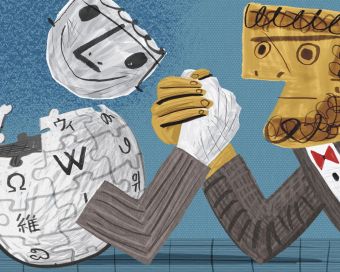Megan McArdle, from The Atlantic, imagines one possible future for [higher] education in the United States
1. Â Education will end up being dominated by a few huge incumbents. Â As we see with Facebook and Twitter and, well, almost everything, the internet offers huge returns to scale, and substantial network effects. Â There’s a big benefit to having learned stuff the same way as the people around you–not least, that they understand what a given certificate means. Â To offer a small example, during my time at the University of Chicago’s business school, every class was curved to a 3.25. Â Most other business schools don’t curve, and as a result, Northwestern, our nearest competitor, had an average GPA of something like 3.8.
Someone at Chicago who had a 3.4 GPA was slightly better than average. Â Someone at Northwestern who had a 3.4 average was kind of a screwup. Â This didn’t matter unless your interviewer had gone to a different school–but if they had, you were apt to find yourself explaining that no, really, that 3.5 wasn’t as bad as it looked. Â Which sounded like whining, even to us.
I would expect that economies of scale and network effects would compress the number of schools to a few–or at least, a few within each specialty. Â The winners might be the early-moving incumbents like MIT and Stanford, or they might be some dark horse who takes advantage of the disruption to rearrange the current status hierarchy. Â But either way, I’d expect to see a few schools dominating, while many go out of business.
2. Â Online education will kill the liberal arts degree. Â Let’s not have the same dismal discussion of whether liberal arts degrees are awesome or useless. Â The important aspect for this discussion is that what they teach is hard to test efficiently. Â There’s enormous variation in grading of, say, English papers, and even if it were easier to standardize, that grading requires hours of expensive labor.
3. Â Professors (course developers) will be selected for teaching instead of research brilliance. The brilliant theorist who drones his way through two courses a year while his students fantasize about stabbing themselves in the eardrum with a plastic fork so they can’t hear the boring anymore . . . that chap will have no place in the online future.
4. Â 95% of tenure-track professors will lose their jobs. Â Or perhaps I should say, 95% of tenure-track jobs will be eliminated; I have no idea if things could change fast enough to knock current professors out of work. Â But if online education really becomes ubiquitous, very few professors will be needed to produce all the education. Â Oh, don’t get me wrong–at the school level, the workforce will still be enormous. Â Probably bigger than it is now, for the schools that win. Â But that will be offset by all the schools that close.
5. Â The corollary of #4 is the end of universities as research centers. Â As I’ve noted before, tenured academics has worked a great scam. Â They’ve managed to monetize peoples’ affection for regional football teams, and their desire for a work credential, and then somehow diverted that money into paying academics to work on whatever they want, for the rest of their lives, without any oversight by the football fans or the employers. Â While I’m sensitive to the complaints of conservative critics, I think that by and large, it’s a very good thing. Â But it’s not a viable business model in cyberspace.
We might see much of academia revert to an amateur past-time, as it was in the 18th and even the 19th century. Â Work with policy implications would likely move to think tanks or consultancies; and I assume that a lot of basic science would continue to be funded by the government, perhaps renting out the labs of defunct universities. Â On the other hand, I’d assume that folks like English professors will have a very difficult time getting funded to do much of anything. Â And before the English professors attack, this is not a commentary on your value to society, just my personal assessment of where the bulk of the funding dollars seem to be.
To get funding in the e-future, research will have to be relevant. Â More specifically, it will have to strike someone with a lot of money at their disposal as relevant.
6. Â Young job-seekers will need new ways to signal diligence. Â I’d expect to see a lot of free labor in the early years, something like what aspiring writers and visual artists already do with their blogs. Â There will be more freelancing, more try-out employment, and more unpaid internships.
7. Â The economics of graduate school will change substantially. Â I’m not sure what would happen to the master’s and professional degrees–would there be a market for intense, focused instruction in small class groups? Â Medical school yes, law school probably, social work . . . um, as long as the government requires it, I guess.
But the PhD would be radically upended. Â Right now, graduate students get miserly stipends in exchange for considerably easing the teaching and research loads of their professors. Â But in an online model, we won’t need so many teachers. Â And the online schools will not necessarily be research centers any more.
The implication is that most students, especially outside of STEM, will have to pay for their PhDs. Â Which should, at the very least, take care of the oversupply problem.
8. Â Civil society will have to substitute for the intense friend networks that are built at college. Â I’m not sure what form this would take–college-age students joining the Elks?–but something will have to substitute. Â Or perhaps people won’t separate from their high school friends as much as they do now.
9. Â The role of schooling in upward mobility will change. Â This is kind of a cop-out, because I’m not sure which way the change runs. Â I can tell a story where eUniversities make it radically easier for smart, poor kids to advance in their spare time. Â I can also tell a story where education is very complementary to the kind of personal networks and social capital that middle-class kids can tap through their parents. Â For poor kids who can get there (and stay there), college provides a lot of education on how to socialize with other college students, and of course, expert professionals who can help you find a job if you ask for help.
10. Â The young will have a much lower financial burden in their 20s. Â That’s hopefully going to translate into more investment, and more risk-taking, which is great for everyone.
11. Â The tutoring industry will boom. Â While tenured professorships will go away, there will be lots of opportunity for those who can help an online student pull through a rough spot. (At least until computers learn to do this too).
12. Â If the credentials become valuable, cheating will be a problem. Â I’d expect online test-taking to eventually shift to test centers like the ones where the GMAT and various professional licensing exams are administered now.


